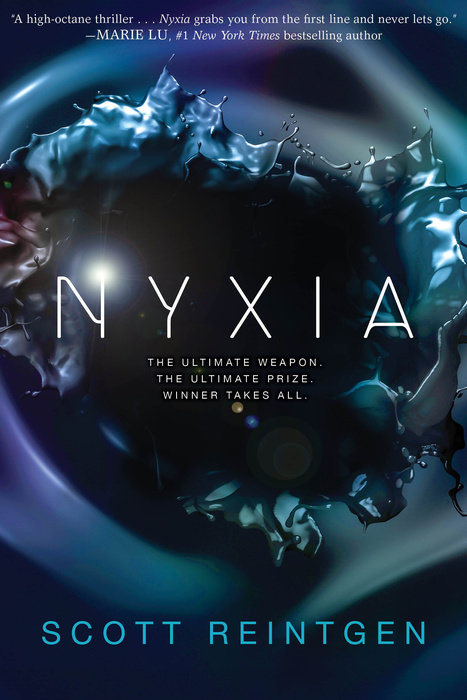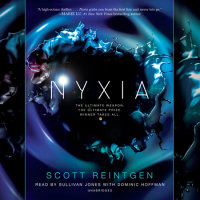Nyxia
Nyxia is a part of the The Nyxia Triad collection.
“A high-octane thriller . . . Nyxia grabs you from the first line and never lets go.” —Marie Lu, #1 New York Times bestselling author of Warcross
Every life has a price in this sci-fi thriller—the first in a trilogy—that has the nonstop action of The Maze Runner and the high-stakes space setting of Illuminae.
What would you be willing to risk for a lifetime of fortune?
Emmett Atwater isn’t just leaving Detroit; he’s leaving Earth. Why the Babel Corporation recruited him is a mystery, but the number of zeroes on their contract has him boarding their lightship and hoping to return to Earth with enough money to take care of his family.
Forever.
Before long, Emmett discovers that he is one of ten recruits, all of whom have troubled pasts and are a long way from home. Now each recruit must earn the right to travel down to the planet of Eden—a planet that Babel has kept hidden—where they will mine a substance called Nyxia that has quietly become the most valuable material in the universe.
But Babel’s ship is full of secrets. And Emmett will face the ultimate choice: win the fortune at any cost, or find a way to fight that won’t forever compromise what it means to be human.
“The 100 meets Illuminae in this high-octane sci-fi thriller.” —Bustle
AND DON'T MISS NYXIA UNLEASHED!
An Excerpt fromNyxia
DAY 1, 8:47 A.M.
Aboard Genesis 11
“You all know why you’re here.”
There are ten of us at the table. We all nod like we even have a clue.
Eight of the richest men and women in the world stand at the opposite end of the conference room. Last night, I used PJ’s phone to look them up. Babel Communications. Swallowed Google back in 2036. Some blogger says they’re NASA’s dark little shadow and have been for decades. Whatever they do, they look good doing it. Each of them wears the same charcoal suit. It looks like someone threaded smoke into formal wear. The overheads dance off all the polished shoulders and shoes.
But the lights and the room and the world are bending forward to hear the man who’s speaking: Marcus Defoe. He’s black, but not like me. I’ve spent half my life feeling like an absence, a moonless night. I can’t imagine this guy going anywhere without turning heads. Everything about him whispers king. It’s in the set of his shoulders and the sound of his voice and the quiet power of his walk. He glides toward us, and a series of warning signs flash through my head. One glance is enough to know he’s the most danger- ous man in the room.
Leaning back, I pull one of my earbuds out. My music was playing low-key but the Asian kid next to me keeps looking over like it’s the loudest thing he’s ever heard. Tough luck. I leave the volume up just to grind at him. When Babel recruited me, they said all of this was a game. I like playing games, but I like winning games even more. The stiff next to me shakes his head in annoyance, and I already feel like I’m up a few points on him.
The earpiece bleeds half beats and old-soul voices. Peo- ple at school think I like early hip-hop ’cause it’s vintage, but the truth is I could never afford the new stuff. When my neighbor glances over for the thousandth time, I nod and smile like we’re going to be best friends.
“You were chosen to be at the forefront of the most serious space exploration known to mankind. The results of your mission will change the outlook for our species.” Defoe goes on to talk about humanity, manifest destiny, and final frontiers. His head is shaved and perfectly round. His smile is blinding. His eyes are so stunningly blue that the girls at school would call them the color of boom. Babel’s king has a single imperfection: His right hand is withered, like a giant took its sweet time breaking each and every bone. It’s the kind of injury you’re not supposed to look at, but always do. “The reward for your efforts will be beyond your imagination. A trust fund has already been established for each of you. A check for fifty thousand dollars will be put into your account every month for the rest of your lives.”
Everyone at the table perks up. Straighter shoulders, wider eyes, less fidgeting. We all react to the numbers because we all must be dead-dancin’ broke. Except one kid.
He looks bored. King Solomon just tossed us the keys to the kingdom, and he’s hiding yawns? I take a closer look. He’s white. I fact-check the table and realize he’s the only white boy here. American? Maybe. Could be European. He’s sporting a plain three-button shirt. He drums his fingers distractedly on the table, and I spot a tag under one armpit. So the shirt’s a recent purchase. His hair looks deliberately imperfect, like he wanted to seem more down-to-earth. When he glances my way, I set both eyes back on Defoe again.
“Beyond monetary stability, we are also offering our medical plans for your families. They now have free access to health care, counseling, surgery, and the most advanced treatments for cancer and other terminal diseases. Those services come without a price tag, and they’re offered in perpetuity.”
I don’t know what perpetuity means, but some of the kids around the table are nodding wisely. Two of them flinched at the word cancer. One’s a girl with blond hair, blue eyes, and enough makeup to place in a pageant. I spy a strand of pink-dyed hair tucked behind one ear. The other kid is really tan with bright brown eyes. Middle Eastern’s my guess. I wonder if their parents have cancer. I wonder if that’s how Babel roped them into this monkey-in-space routine. I wonder if they noticed me flinch right around the same time they did.
It’s hard to hear the words that follow, because an image of Moms has snagged my attention. Those bird-thin wrists circled by medical bracelets. We spent enough time in the ICU that the hospital started feeling like a prison. Only difference is that some diseases don’t grant parole.
“. . . we offer stock options with our company, internal connections with any business in the world, and an opportunity to put your name in the history of the human race. Desmond is passing out a gag order. If you’re still interested, just sign on the dotted line.”
One of the lesser suits makes the rounds. He sets hot-off-the-presses forms in front of each of us. I can’t stop staring at the massive gold watch on his wrist. In less-promising circumstances, I’d whoops my way out of my chair, slip it off his wrist, and stranger my way out of the room before he knew which way was west. But life is good, so I carefully skim a paragraph with words like privatization and extrajudicial. On my left, the Asian kid considers a strange gathering of symbols. The girl on my right’s reading something that looks a little beyond the reach of my high school Spanish. I almost laugh, thinking we’re the politically correct version of the Justice Squad. But if Babel’s looking for heroes, they picked the wrong guy.
I sign on the dotted line and try to look like I didn’t just win the lottery.
The suits whisper million-dollar secrets. Defoe prowls a casual, predatory circle to make sure we’re all being good little boys and girls. I hit next on my shuffle and a nice unfiltered beat drops. Two voices duet their way to a bare-bones chorus. They trade lyrics until it feels like I’m back in the concrete jungle, ciphering and laughing with the Most Excellent Brothers.I miss the boys already, especially PJ. Our neighborhood’s pretty full of dead ends, though, and Babel’s offering a way out. I don’t know what their offer means to the other kids around the table, but to me it means Moms getting her name at the top of the transplant lists. It means Pops not working night shifts. It means three meals a day and more than one pair of jeans.
To me, this is everything.



